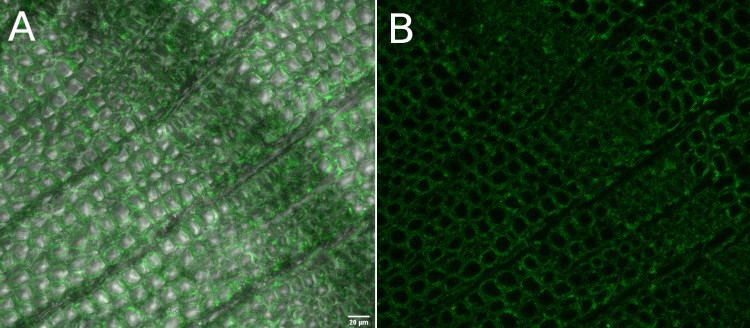1

Anti-Heteroxylan (monoclonal, clone LM11)
From the laboratory of Paul Knox, Phd, University of Leeds, United Kingdom
- Product Info
-
Immunogen: Neoglycoprotein (xylopentaose-BSA), Heteroxylan Sub class: IgM Host: Rat Clonality: Monoclonal Purity: Cell culture supernatant. Format: Liquid Quantity: 1 ml Storage: Store at +4°C (short term) and at -20°C (long term). Tested applications: ELISA (ELISA), Immuniflourescence (IF) Recommended dilution: 1:10 (ELISA, IF) - Reactivity
-
Confirmed reactivity: Higher plants, ferns and mosses Not reactive in: No confirmed exceptions from predicted reactivity are currently known - Application Examples
-

Type of material: Spruce (Picea abies) wood frozen in -80ºC Fixation: paraformaldehyde (4%)
Hydrophilization: no
Cell wall digestion: no
Membrane permeabilization: none
Antigen retrieval: no
Blocking buffer: 5% milk in PBS
Washing buffer: 5% milk in PBS-T
Primary antibody: 1:20 incubation 90 minutes at room temperature
Secondary antibodyr: Thermo Fisher Goat anti-Rat IgG (H+L) Cross-Adsorbed Secondary Antibody, Alexa Fluor™ 633 (A-21094)
Co-staining of the nucleus (DAPI): no
Cell wall and nucleus staining: noneCourtesy of Dr. Jan Łyczakowski, Jagiellonian University, Kraków, Poland
- Additional Information
-
Additional information: Contains 0.05% Sodium Azide.
Binds strongly to wheat arabinoxylan and it can recognise unsubstituted and relatively low-substituted xylans. - Background
-
Background: The plant cell wall surrounds the plant cell as a complex network of polysaccharides classed as: cellulose, hemicelluloses and pectic polysaccharides and glycoproteins. Anchored to or embedded into plant cell wall are other polymers, like: lignin, suberin or cutin. Xylan is a group of hemicelluloses in plant cells walls and can also be found in some algae. - Product Citations
-
Selected references: McCartney et al. (2005). Monoclonal antibodies to plant cell wall xylans and arabinoxylans. J Histochem Cytochem. 2005 Apr;53(4):543-6.doi: 0.1369/jhc.4B6578.2005. - Protocols
- Immunofluorsecence as described in: Developmental complexity of arabinan polysaccharides and their processing in plant cell walls Verhertbruggen Y, Marcus SE, Haeger A, Verhoef R, Schols HA, McCleary BV, McKee L, Gilbert HJ, Knox JP., The Plant Journal (2009) 59, 413–425.
- Reviews:
-
This product doesn't have any reviews.
Accessories

AS16 3229-1ml | Clonality: monoclonal | Host: Mouse | Reactivity: Betula sp., Eucalyptus sp., Populus sp., Sorghum sp., Triticum sp.
From the laboratory of Michael G. Hahn, PhD, University of Georgia

AS16 3227-1ml | Clonality: monoclonal | Host: Mouse | Reactivity: Phormium sp., Sorghum sp., Triticum sp., Zea mays
From the laboratory of Michael G. Hahn, PhD, University of Georgia

AS16 3135-1ml | Clonality: monoclonal | Host: Mouse | Reactivity: A. pseudoplatanus, A. thaliana, Phormium sp., S. lycopersicum, S. tuberosum, T. indicus
From the laboratory of Michael G. Hahn, PhD, University of Georgia

From the laboratory of Paul Knox, Phd, University of Leeds, United Kingdom
